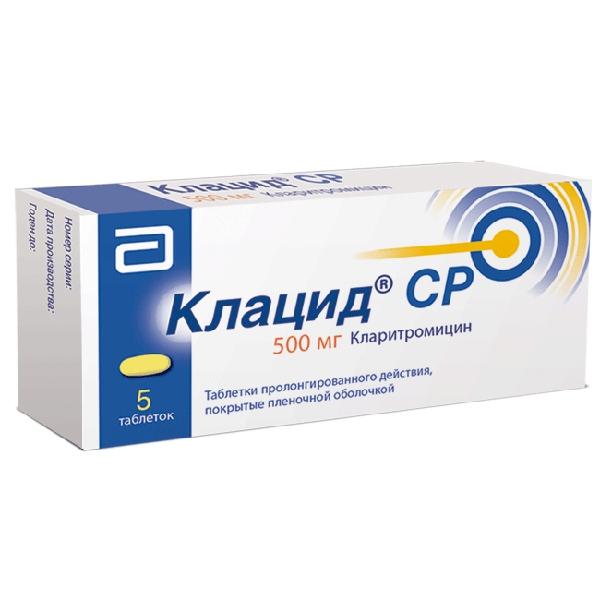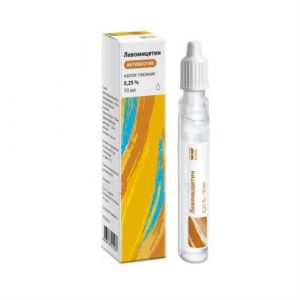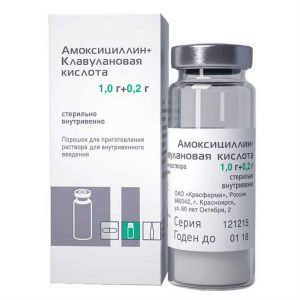Description
Latin name
KLACID SR
Release form
sustained-release tablets coated tablets
Packing
5 pcs
Pharmacological action of
Klacid SR – an antibiotic of the macrolide group. Clarithromycin inhibits protein synthesis in a microbial cell by interacting with the 50S ribosomal subunit of bacteria. Highly active against a wide range of aerobic, anaerobic, gram-positive and gram-negative bacteria.
Clarithromycin showed high in vitro activity against standard and isolated bacterial cultures. Highly effective against many aerobic and anaerobic gram-positive and gram-negative microorganisms. In vitro studies confirm the high efficacy of clarithromycin against Legionella pneumophila and Mycoplasma pneumoniae.
drug is also active against aerobic gram-positive bacteria: Staphylococcus aureus, Streptococcus pneumoniae, Streptococcus pyogenes, Listeria monocytogenes aerobic gram-negative organisms: Haemophilus influenzae, Haemophilus parainftuenzae, Moraxella catarrhalis, Neisseria gonorrhoeae other microorganisms: Mycoplasma pneumoniae, Chlamydia pneumoniae (TWAR), Chlamydia trachomatis Mycobacterium leprae, Mycobacterium kansasii, Mycobacterium chelonae, Mycobacterium fortuitum, Mycobacterium avium complex (MAC): Mycobacterium avium, Mycobacferium intracellulare.
Enterobacteriaceae, Pseudomonas spp., as well as other lactose-free gram-negative bacteria are insensitive to clarithromycin.
Production of b-lactamase does not affect the activity of clarithromycin. Most strains of staphylococci resistant to methicillin and oxacillin are resistant to clarithromycin.
Clarithromycin has an in vitro effect on most strains of the following microorganisms (however, the safety and efficacy of clarithromycin in clinical practice has not been confirmed by clinical studies, and the practical significance remains unclear): aerobic gram-positive microorganisms: Streptococcus agalactiae, streptococci (groups C, F, G ), streptococci of the Viridans group aerobic gram-negative microorganisms: Bordeteila pertussis, Pasteurella multocida anaerobic gram-positive microorganisms: Clostridium perfringens, Peptococcus niger, Propionibacterium acnes anaerobic gram-negative microorganisms: Bacteroides melaninogenicus Borrelia burgdorferi, Treponema pallidum, Campylobacter jejuni.
The microbiological activity of the metabolite is the same as that of the starting material, or 1-2 times weaker against most microorganisms. The exception is Haemophilus influenzae, for which the metabolite is 2 times more effective. The starting material and its main metabolite have either an additive or synergistic effect against Haemophilus influenzae in vitro and in vivo, depending on the culture of the bacteria.
Sustained-release tablets are a uniform crystalline base, during the passage of which through the gastrointestinal tract provides a prolonged release of the active substance.
Indications
– lower respiratory tract infections (including bronchitis, pneumonia)
– upper respiratory tract infections (including pharyngitis, sinusitis)
– infections of the skin and soft tissues (including folliculitis, erysipelas).
Contraindications
– severe renal impairment (with CC less than 30 ml / min), patients are prescribed clarithromycin quick release
– simultaneous administration of astemizole, cisapride, pimozide, terfenadine
– porphyria srdrdkp – pregnancy hypersensitivity to antibiotics of the macrolide group.
Use during pregnancy and lactation
The safety of clarithromycin during pregnancy and lactation has not been studied.
Clarithromycin is known to be excreted in breast milk.
Therefore, the use of the drug Klacid SR during pregnancy and lactation should only be in cases where there is no safer alternative, and the risk associated with the disease itself exceeds the possible harm to the mother and fetus.
Composition
1 tab. contains clarithromycin 500 mg
Dosage and administration of
Adults Klacid CP prescribed 500 mg (1 tab.) 1 time / day. In severe infections, the dose is increased to 1 g (2 tablets) 1 time / day.
Tablets should be taken with food, swallowed whole, without breaking or chewing.
Side effects of
From the cardiovascular system: rarely – ventricular arrhythmia, including ventricular tachycardia (with an increase in the QT interval).
From the digestive system: nausea, abdominal pain, vomiting, diarrhea, gastralgia, pancreatitis, glossitis, stomatitis, candidiasis of the oral cavity, discoloration of the tongue and teeth rarely – pseudomembranous enterocolitis. Dental discoloration is reversible and is usually restored by professional brushing at the dentist. Dysfunction of the liver was rarely observed, including increased activity of hepatic enzymes, hepatocellular and / or cholestatic hepatitis with or without jaundice. These liver dysfunctions can be severe, but they are usually reversible. Cases of liver failure and death have been very rare, mainly due to severe concomitant diseases and / or concomitant drug therapy.
From the side of the central nervous system: transient headaches, dizziness, anxiety, insomnia, nightmares, tinnitus, depersonalization, hallucinations, cramps, a feeling of fear rarely – psychosis, confusion in some cases – hearing loss (when you stop taking clarithromycin, your hearing returns), a change in smell (usually accompanied by distortions in taste).
Allergic reactions: urticaria, hyperemiaskin, itchy skin, anaphylaxis, Stevens-Johnson syndrome.
From the hemopoietic system: leukopenia, thrombocytopenia.
On the part of laboratory indicators: an increase in blood creatinine is rare – hypoglycemia (while taking hypoglycemic drugs).
Others: development of microbial resistance.
Overdose
Symptoms: nausea, vomiting, abdominal pain, diarrhea. One patient with a history of bipolar disorder after 8 grams of clarithromycin received changes in mental state, paranoid behavior, hypokalemia, and hypoxemia.
Treatment: Remove the unabsorbed drug from the gastrointestinal tract and carry out symptomatic therapy. Hemodialysis and peritoneal dialysis have no significant effect on serum clarithromycin levels.
Storage conditions
The drug should be stored in a dark place out of the reach of children at a temperature not exceeding 30 ° C.
The Expiration of
is 3 years.
Deystvuyuschee substances
clarithromycin
drugstore terms
Dosage form
Dosage form
tablets prolong.



